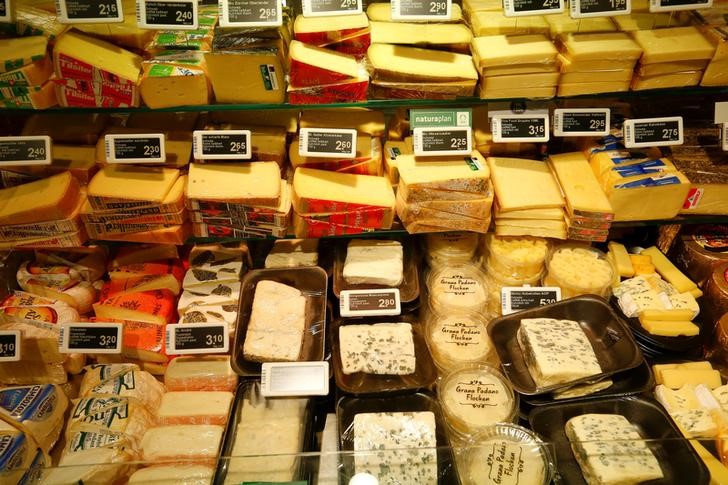By Allison Martell and Philip Blenkinsop
TORONTO/BRUSSELS, Sept 13 (Reuters) - A trade deal meant to give European cheesemakers more access to the Canadian market is falling short of its promise in its first full year, government data show, frustrating the European industry, which blames a year-old Ottawa quota system.
Under the Comprehensive Economic and Trade Agreement (CETA) with the European Union, Canada agreed to more than double tariff-free imports of cheese over five years, starting in September 2017. The new imports will eventually represent about 4 percent of the Canadian cheese market.
Small quotas for 2017 were filled, but more than eight months into 2018, only 36 percent of the high-quality cheese quota has been used. European imports under quotas that predate CETA are on track for the year, suggesting something about the new quotas, which are allocated differently, is limiting imports. Many of the old quotas are held by specialist importers, which are largely shut out of the new system.
Frustration with the system could be a warning sign to the United States, which is demanding greater access to Canada's sheltered dairy industry in a revised North American Free Trade Agreement (NAFTA). Canada is willing to make concessions, Reuters reported on Tuesday, although it is unclear what proposals are on the table. L2N1VX1AH
"We were hoping and expecting to significantly increase our Canadian sales," said Attilio Zanetti, whose Italy-based company Zanetti exports to Canada. "I would not recommend Canada's CETA cheese tariff rate quota scheme to the Americans. My advice would be 'Buyer Beware'."
The European Commission said it is monitoring the issue, although it is too early to determine what is behind the trend. It requested that a Sept. 19 meeting with Canadian officials include a discussion of the management of the quotas.
In a statement, Global Affairs Canada said it expects usage to rise in the months ahead, especially between Thanksgiving and New Year: "The time required to establish business links can impact the timing of import and utilization."
QUOTAS VS TARIFFS
Even so, lawyer James McIlroy, who represents importers through the International Cheese Council of Canada, expects that U.S. NAFTA negotiators will push for an end to Canadian tariffs, not import quotas.
"The Americans will not settle for that," he said. "They've seen what happened to the Europeans."
Under the CETA deal, which was a major concession from a country where dairy processing is worth C$15.2 billion ($11.7 billion) annually, Canada set aside half of the new quota for Canadian cheesemakers, an indirect support as they face new competition. The rest went to Canadian retailers and distributors based on their market share, including sales of Canadian cheese.
From the start, the European dairy industry argued that Canadian cheesemakers would use their quota to limit competition by importing selectively or not at all. But refusing to import could backfire for Canadian companies, as they could lose the right to import in future under the terms of the CETA quota system.
Major Canadian dairy companies, including Saputo Inc SAP.TO and Agropur hold quotas. But in a break from the past, Canada also divided quotas between many companies, allocating 60 percent to small firms. That fragmentation has made it difficult to import profitably, especially this year, according to quota holders, as allocations start small and rise each year.
Alberta-based retailer and pork producer Sunterra Group, a new quota holder, will use all its quota to import nearly four tonnes of parmesan from Italy this year, Sunterra President Ray Price said. But it was a challenge to ship so little, since cheese is transported in 18 tonne containers. Price would rather buy four times more.
"If you're a small organization, I can see where people would say, 'I'll do it next time,'" he said.
Two small import quota holders, a retailer and a cheesemaker, said they had been struggling to use their quota profitably. Both were preparing to transfer it to a distributor.
In a statement, the Dairy Processors Association of Canada, which represents large and small cheesemakers but not the smallest artisanal producers, said its members have had no issues filling quotas.
The association's President Mathieu Frigon said any future quotas should go to "those who will suffer losses from trade agreements."
"If the Europeans feel short-changed in terms of market access, it is because of who the government gave the CETA TRQs (tariff rate quotas) to and how they manage their business," he said.
